
Summer is finally here, and with it comes an abundance of seasonable fruits and vegetables. One fruit in particular, the papaya, sees its peak in early summer and fall. The papaya tree, native to South and Central America, is believed to have been first cultivated in Mexico. Despite its proximity to the United States, papayas are often labeled as “exotic” fruits, which may be intimidating to consumers. Don’t be fooled! Selecting, storing and eating papayas is just as simple as eating a banana or apple. Here are three easy steps to enjoying this delicious fruit:
1. Select: Papayas can be found year-round in North American grocery stores. For the best taste, choose papayas in the summer and early fall. When selecting papayas, think about when you plan on eating them. Papayas orange/red in color are reaching the peak of their ripeness and should be eaten the day of purchase. Yellow papayas are under-ripe, and can be eaten 2-3 days after purchase.
2. Store: Ripe papayas should be stored in a refrigerator and will remain fresh for up to one week. Yellow, under-ripe papayas can be stored at room temperature; this will speed up the ripening process. Keeping papayas in a paper bag (especially with bananas) will greatly increase the ripening process as well.
3. Eat and enjoy: Papayas are delicious on their own. Simply cut the papaya in half, remove the dark seeds (if a papaya is ripe, the seeds will come out easily with a spoon) and eat. Extremely ripe papayas can be cut or even spooned out of their skins. Sprinkling some lime or lemon juice on a fresh papaya will enhance its natural flavor. Papayas are also great to enjoy in smoothies, salads and entrees.
Papayas contain a large number of nutrients, including vitamins C and A, folate, magnesium, potassium and fiber. Papayas also contain papain, a digestive enzyme that can be used to tenderize meat. These nutrients give the papaya a multitude of health benefits such as the promotion of good cardiovascular, immune and digestive health.
Don’t be intimidated by the papaya — it may seem exotic but can become a staple in your kitchen.


